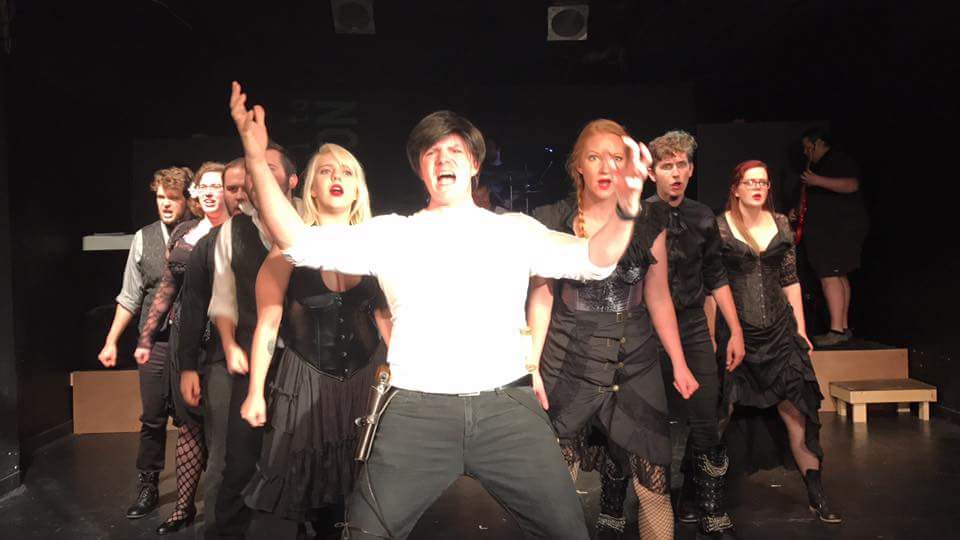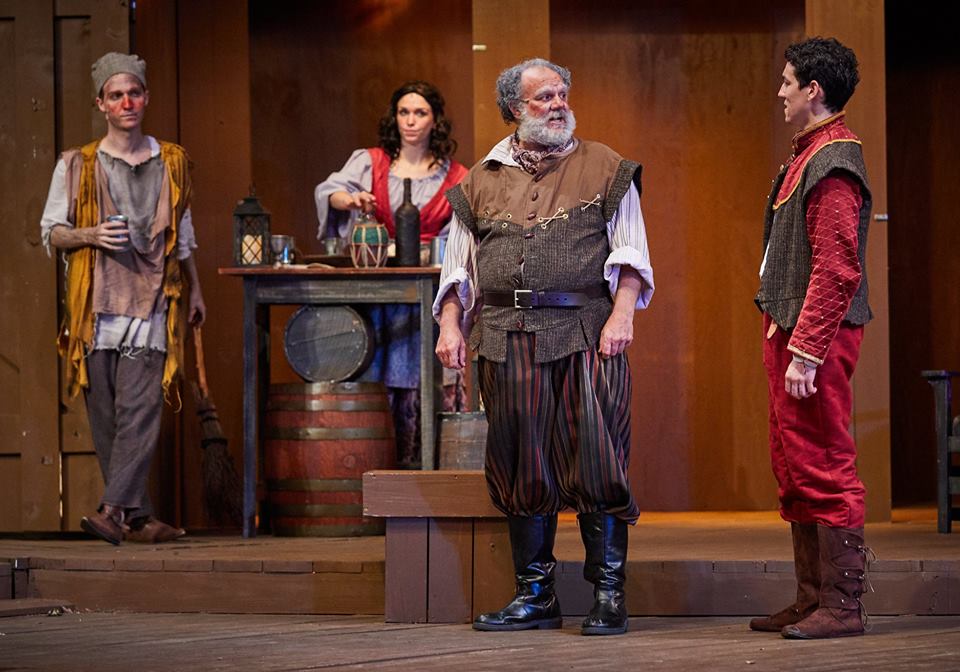Christopher Shiner and the cast of Bloody Bloody Andrew Jackson. Photo by Hannegan Roseberry.
Bloody Bloody Andrew Jackson
By Alex Timbers
Music & lyrics by Michael Friedman
Directed by Valerie Canon
Review by Keith Waits
Entire contents copyright © 2017 by Keith Waits. All rights reserved
Contemporary culture has been finding new takes on American History, and the stage has led the way: Hamilton was the kind of huge mega-success that eventually finds a backlash of fatigue, but in 2010, before that monster hit, Broadway hosted Bloody, Bloody, Andrew Jackson, a lean and hip rock musical about one of the most controversial of American Presidents. Once lionized as a hero, Jackson has become for many a symbol of the brutal and racist elements of our past. An independent military hero who expanded American territory to the south and west, he eventually became the 7th President of the United States, founding the Democratic Party and taking office on a wave of populist support as a firebrand outsider to Washington politics (he had, in fact, served as Florida Governor, a Senator from Tennessee, and a member of that state’s Supreme Court).
Any parallels to the current occupant of the White House are hard to avoid, even if the book by Alex Timbers might have been more inspired by Reagan or even the 2nd Bush administration than a Trump presidency that would have likely been looked upon as a bad joke almost 10 years ago.
It is entirely possible that the broadly conceived, satirical view of formative history was intended to parody the general character of modern politics and the cult of personality which is the essential beating heart of presidential campaigns. Donald Trump is certainly not the first populist demagogue to rise to prominence, and Jackson, whatever his crimes, earned his reputation in true rebel fashion, chasing French and Spanish armies away when government forces would not respond effectively.
But BBAJ is but a rough sketch of a complex reality, using a selective reading of history to make its points about self-righteousness and, more importantly, fashion a raucous and ribald entertainment that will most likely send audiences to history books, or at least Wikipedia, to educate themselves on Jackson. I offer no defense of the man, but the text here makes no bones about the subjective point-of-view condemning not only Jackson, but the recalcitrant character of the southern culture that seems to be part of his legacy. When, at the top of the second act, an average citizen is given to say of presidential candidate Jackson, who he has previously disliked, “…then he bowed to us…the people, and all my problems with him melted away,” it cannot help but feel a commentary on the southern and mid-western support for a candidate who seems sadly out-of-touch with their day-to-day reality.
Valerie Canon stages her production with a smart eye for the satire. Several times she blocks the action into a forward triangle with Jackson himself at the point, a sly parody of the bravura Les Miserables formation, and she works with Music Director Paul Stiller to achieve the right balance between a 4-piece rock band and singers performing without the benefit of microphones. The score aches for the band to cut loose more, and they sound like they could do exactly that, but we can hear the vocals only because of this necessary restraint. Canon is a dancer and choreographer, so it is no surprise that she knows how to move her cast around, and the ensemble numbers, such as “The Great Compromise,” have clarity and wit precisely because she understands how to work the tight space with 8-10 bodies in close quarters.
Christopher Shiner is a strutting wonder of male ego and ambition, every inch a grungy rock star, and only after establishing that does he touch upon the deeper currents of the historic Andrew Jackson. His singing voice is limited, but he knows he to project, by god, and his fierce energy and commitment feel right for the piece.
Victoria Edgar is pretty good as his wife Rachel, and her solo number, “The Great Compromise,” is a highlight because she can boast arguably the best voice of the evening. The ensemble is filled with both good collaborative work and fine individual moments from members occupying roles as historical figures Henry Clay (Andrew Mertz), James Monroe (Taylor Clemons), Martin Van Buren (the excellent James Thompson), John Quincy Adams (Eliot Tarkington), and John Calhoun (Spencer Korcz). At first, this band of politicians is deeply skeptical and contemptuous of Jackson, but they are all seen as to varying degrees sycophantic when he is elected President. Does that seem at all familiar?
Magnolia Hensley is very funny as a contemporary character, a Storyteller whose adoration for Jackson is soured when her perspective does not always find favor with her subject, and Caitlin Clemons, Heather Lundberg Green, Anna Shelton, and Joy Beth DeWitt round out the cast with sassy energy as utility players outfitted in what would pass for sexy in 1825 and still works on that level today; kudos to Carol Dines and Mandy Kramer on the curious mash-up of periods that make up the costumes.
Despite the famous warning against acting opposite children, the adults manage to let Brooks Roseberry not entirely steal his scenes as Jackson’s adopted Native American son, Lyncoya, but he is relaxed and just precocious enough to be winning. There has been some controversy about the depiction of the Native American characters as stereotypical, and the most significant character in this regard is Paul Stiller’s Black Fox, who aids Jackson in his degradation of indian tribes in the south before rebelling against him in force.
Mostly the “injuns,” as Jackson refers to them, are depicted as interchangeable primitives in a rapid succession of negotiations meant to underscore how ruthlessly the rapacious “Indian fighter” subjugated them. Jackson’s treatment of Native Americans is unquestionably the sorest point in his history, a brutal and contradictory policy that led to the Trail of Tears and the near genocide of indigenous people. At the time it was a popular policy, making any look at Andrew Jackson a look into our own dark heart as a nation.
So I beg pardon if Bloody Bloody Andrew Jackson has prompted an overly serious tone, but sometimes popular entertainment can be gloriously silly and still thought-provoking. I suppose that means you get your money’s worth out of this show.
Bloody Bloody Andrew Jackson
August 10 – 26, 2017
Go to Alleytheater.org for exact schedule for each production and tickets.
Tickets $20
The Alley Theater
615 West Main Street
Louisville, Kentucky 40202
502-713-6178
thealleytheater.org
 Keith Waits is a native of Louisville who works at Louisville Visual Art during the days, including being the host of PUBLIC on WXOX-FM 97.1/ ARTxFM.com, but spends most of his evenings indulging his taste for theatre, music and visual arts. His work has appeared in Pure Uncut Candy, TheatreLouisville, and Louisville Mojo. He is now Managing Editor for Arts-Louisville.com.
Keith Waits is a native of Louisville who works at Louisville Visual Art during the days, including being the host of PUBLIC on WXOX-FM 97.1/ ARTxFM.com, but spends most of his evenings indulging his taste for theatre, music and visual arts. His work has appeared in Pure Uncut Candy, TheatreLouisville, and Louisville Mojo. He is now Managing Editor for Arts-Louisville.com.





